七年级英语下册Unit5Ourschoollife知识点及练习(无答案)(新版)仁爱版
- 格式:doc
- 大小:43.50 KB
- 文档页数:5
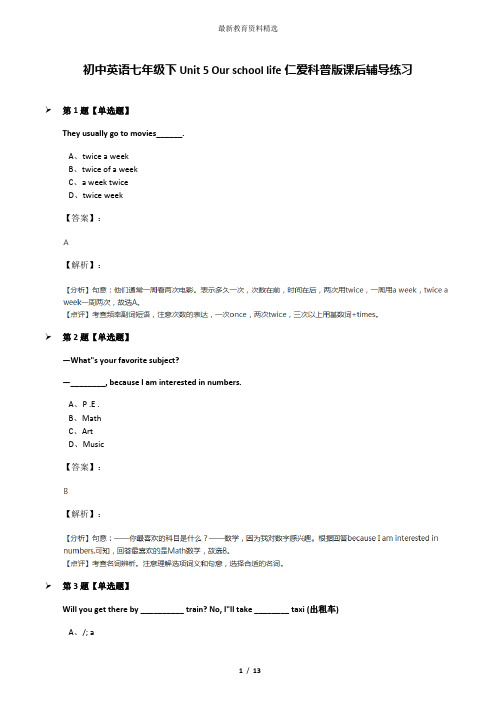
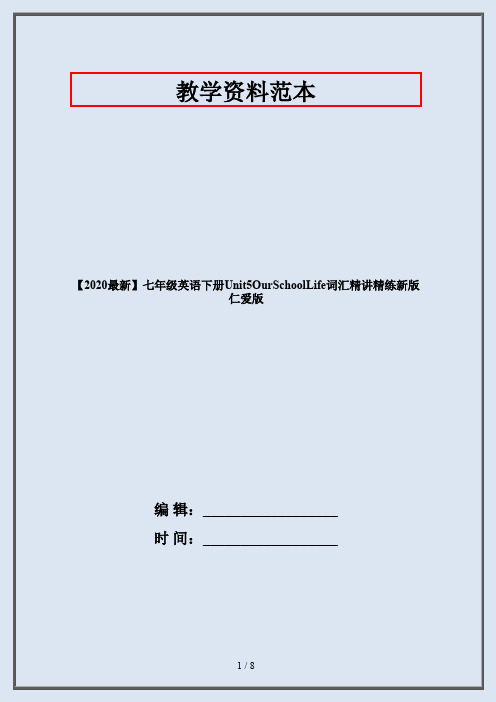
教学资料范本【2020最新】七年级英语下册Unit5OurSchoolLife词汇精讲精练新版仁爱版编辑:__________________时间:__________________精讲精练词汇精讲1. alwaysalways是频度副词,意为“一直,总是”。
它的反义词是never, 意为“从不”。
常用于一般现在时,其划线提问要用How often +一般疑问句。
例如:She always likes birthday cards. 她总是喜欢生日贺卡。
【拓展】always, usually, often, sometimes和never是英语中最常见的频度副词。
(1)always的频度约为100%,表示动作重复、状态继续,中间没有间断,意为“总是、永远地”。
例如:The sun always rises in the east and sets in the west. 太阳总是东升西落。
(2)usually的频度为约80%左右,意为“通常、平常”,即很少有例外。
例如:He usually goes to bed at ten o’clock. 他通常十点钟睡觉。
(3)often的频度为约60%左右,意为“常常”,但不如usually那么频繁,表示动作重复,中间有间断。
例如:He is often late for school. 他上学经常迟到。
(4)sometimes的频度约为40%左右,意为“有时”,表示动作偶尔发生。
可以位于句首,以示强调。
例如:It is sometimes hot and sometimes cold. 天气忽冷忽热。
Sometimes he does it this way and sometimes he does it that way.他有时这样做,有时那样做。
(5)seldom的频度约为20%左右,意为“很少、不经常”。
例如:I hardly ever go out these days. 这些天我几乎不出门。

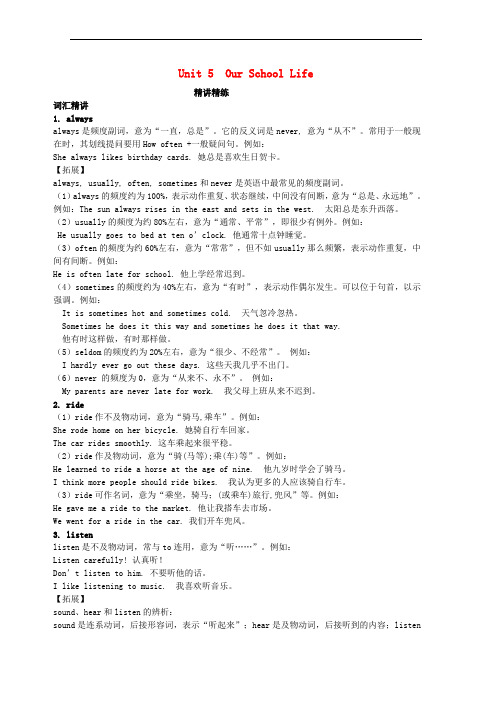
Unit 5 Our School Life精讲精练词汇精讲1. alwaysalways是频度副词,意为“一直,总是”。
它的反义词是never, 意为“从不”。
常用于一般现在时,其划线提问要用How often +一般疑问句。
例如:She always likes birthday cards. 她总是喜欢生日贺卡。
【拓展】always, usually, often, sometimes和never是英语中最常见的频度副词。
(1)always的频度约为100%,表示动作重复、状态继续,中间没有间断,意为“总是、永远地”。
例如:The sun always rises in the east and sets in the west. 太阳总是东升西落。
(2)usually的频度为约80%左右,意为“通常、平常”,即很少有例外。
例如:He usually goes to bed at ten o’clock. 他通常十点钟睡觉。
(3)often的频度为约60%左右,意为“常常”,但不如usually那么频繁,表示动作重复,中间有间断。
例如:He is often late for school. 他上学经常迟到。
(4)sometimes的频度约为40%左右,意为“有时”,表示动作偶尔发生。
可以位于句首,以示强调。
例如:It is sometimes hot and sometimes cold. 天气忽冷忽热。
Sometimes he does it this way and sometimes he does it that way.他有时这样做,有时那样做。
(5)seldom的频度约为20%左右,意为“很少、不经常”。
例如:I hardly ever go out these days. 这些天我几乎不出门。
(6)never 的频度为0,意为“从来不、永不”。
例如:My parents are never late for work. 我父母上班从来不迟到。
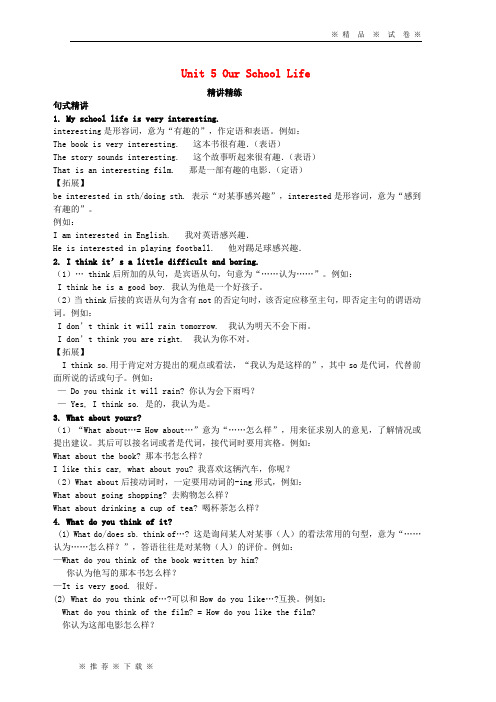
Unit 5 Our School Life精讲精练句式精讲1. My school life is very interesting.interesting是形容词,意为“有趣的”,作定语和表语。
例如:The book is very interesting. 这本书很有趣.(表语)The story sounds interesting. 这个故事听起来很有趣.(表语)That is an interesting film. 那是一部有趣的电影.(定语)【拓展】be interested in sth/doing sth. 表示“对某事感兴趣”,interested是形容词,意为“感到有趣的”。
例如:I am interested in English. 我对英语感兴趣.He is interested in playing football. 他对踢足球感兴趣.2. I think it’s a little difficult and boring.(1)… think后所加的从句,是宾语从句,句意为“……认为……”。
例如:I think he is a good boy. 我认为他是一个好孩子。
(2)当think后接的宾语从句为含有not的否定句时,该否定应移至主句,即否定主句的谓语动词。
例如:I don’t think it will rain tomorrow. 我认为明天不会下雨。
I don’t think you are right. 我认为你不对。
【拓展】I think so.用于肯定对方提出的观点或看法,“我认为是这样的”,其中so是代词,代替前面所说的话或句子。
例如:— Do you think it will rain? 你认为会下雨吗?— Yes, I think so. 是的,我认为是。
3. What about yours?(1)“What about…= How about…”意为“……怎么样”,用来征求别人的意见,了解情况或提出建议。
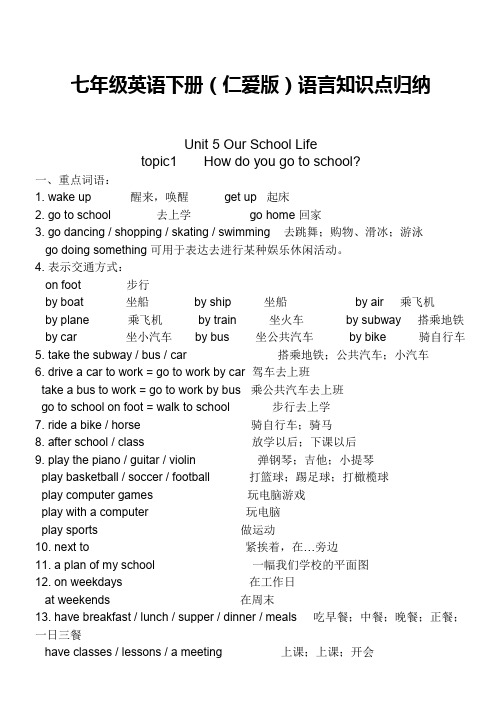
七年级英语下册(仁爱版)语言知识点归纳Unit 5 Our School Lifetopic1 How do you go to school?一、重点词语:1. wake up 醒来,唤醒 get up 起床2. go to school 去上学 go home 回家3. go dancing / shopping / skating / swimming 去跳舞;购物、滑冰;游泳go doing something 可用于表达去进行某种娱乐休闲活动。
4. 表示交通方式:on foot 步行by boat 坐船 by ship 坐船 by air 乘飞机by plane 乘飞机 by train 坐火车 by subway 搭乘地铁by car 坐小汽车 by bus 坐公共汽车 by bike 骑自行车5. take the subway / bus / car 搭乘地铁;公共汽车;小汽车6. drive a car to work = go to work by car 驾车去上班take a bus to work = go to work by bus 乘公共汽车去上班go to school on foot = walk to school 步行去上学7. ride a bike / horse 骑自行车;骑马8. after school / class 放学以后;下课以后9. play the piano / guitar / violin 弹钢琴;吉他;小提琴play basketball / soccer / football 打篮球;踢足球;打橄榄球play computer games 玩电脑游戏play with a computer 玩电脑play sports 做运动10. next to 紧挨着,在…旁边11. a plan of my school 一幅我们学校的平面图12. on weekdays 在工作日at weekends 在周末13. have breakfast / lunch / supper / dinner / meals 吃早餐;中餐;晚餐;正餐;一日三餐have classes / lessons / a meeting 上课;上课;开会14. watch TV / movies / games / the animals 看电视;电影;比赛;动物read novels / newspapers / books 看小说;报纸;书15. wash one’s face / clothes 洗脸;衣服16. 反义词:up – down, early – late 近义词:quickly – fastget up early 早起 be late for 迟到17. the first / second / third / fourth day 第一;二;三;四天18. clean the house 打扫房子19. 表示建筑物(尤其学校建筑物):on the playground 在操场at school / home / table 在学校;家里;桌旁in a computer room / teachers’ of fice / classroom building / gym / library / lab / canteen在电脑室;教师办公室;教学楼;体操馆;图书馆;实验室;食堂20. around six o’clock = at about six o’clock大约在六点21. 频率副词:never, seldom, sometimes, often, usually, always二、重点句型:1. It’s time to get up.该起床的时候了。
Unit 5 Our School Life精讲精练词汇精讲1. alwaysalways是频度副词,意为“一直,总是”。
它的反义词是never, 意为“从不”。
常用于一般现在时,其划线提问要用How often +一般疑问句。
例如:She always likes birthday cards. 她总是喜欢生日贺卡。
【拓展】always, usually, often, sometimes和never是英语中最常见的频度副词。
(1)always的频度约为100%,表示动作重复、状态继续,中间没有间断,意为“总是、永远地”。
例如:The sun always rises in the east and sets in the west. 太阳总是东升西落。
(2)usually的频度为约80%左右,意为“通常、平常”,即很少有例外。
例如:He usually goes to bed at ten o’clock. 他通常十点钟睡觉。
(3)often的频度为约60%左右,意为“常常”,但不如usually那么频繁,表示动作重复,中间有间断。
例如:He is often late for school. 他上学经常迟到。
(4)sometimes的频度约为40%左右,意为“有时”,表示动作偶尔发生。
可以位于句首,以示强调。
例如:It is sometimes hot and sometimes cold. 天气忽冷忽热。
Sometimes he does it this way and sometimes he does it that way.他有时这样做,有时那样做。
(5)seldom的频度约为20%左右,意为“很少、不经常”。
例如:I hardly ever go out these days. 这些天我几乎不出门。
(6)never 的频度为0,意为“从来不、永不”。
例如:My parents are never late for work. 我父母上班从来不迟到。
Unit 5 Our School Life精讲精练句式精讲1. My school life is very interesting.interesting是形容词,意为“有趣的”,作定语和表语。
例如:The book is very interesting. 这本书很有趣.(表语)The story sounds interesting. 这个故事听起来很有趣.(表语)That is an interesting film. 那是一部有趣的电影.(定语)拓展be interested in sth/doing sth. 表示“对某事感兴趣”,interested是形容词,意为“感到有趣的”。
例如:I am interested in English. 我对英语感兴趣.He is interested in playing football. 他对踢足球感兴趣.2. I think it’s a little difficult and boring.(1)… think后所加的从句,是宾语从句,句意为“……认为……”。
例如:I think he is a good boy. 我认为他是一个好孩子。
(2)当think后接的宾语从句为含有not的否定句时,该否定应移至主句,即否定主句的谓语动词。
例如:I don’t think it will rain tomorrow. 我认为明天不会下雨。
I don’t think you are right. 我认为你不对。
拓展I think so.用于肯定对方提出的观点或看法,“我认为是这样的”,其中so是代词,代替前面所说的话或句子。
例如:— Do you think it will rain? 你认为会下雨吗?— Yes, I think so. 是的,我认为是。
3. What about yours?(1)“What about…= How about…”意为“……怎么样”,用来征求别人的意见,了解情况或提出建议。
Unit 5 Our School Life精讲精练词汇精讲1. alwaysalways是频度副词,意为“一直,总是”。
它的反义词是never, 意为“从不”。
常用于一般现在时,其划线提问要用How often +一般疑问句。
例如:She always likes birthday cards. 她总是喜欢生日贺卡。
【拓展】always, usually, often, sometimes和never是英语中最常见的频度副词。
(1)always的频度约为100%,表示动作重复、状态继续,中间没有间断,意为“总是、永远地”。
例如:The sun always rises in the east and sets in the west. 太阳总是东升西落。
(2)usually的频度为约80%左右,意为“通常、平常”,即很少有例外。
例如:He usually goes to bed at ten o’clock. 他通常十点钟睡觉。
(3)often的频度为约60%左右,意为“常常”,但不如usually那么频繁,表示动作重复,中间有间断。
例如:He is often late for school. 他上学经常迟到。
(4)sometimes的频度约为40%左右,意为“有时”,表示动作偶尔发生。
可以位于句首,以示强调。
例如:It is sometimes hot and sometimes cold. 天气忽冷忽热。
Sometimes he does it this way and sometimes he does it that way.他有时这样做,有时那样做。
(5)seldom的频度约为20%左右,意为“很少、不经常”。
例如:I hardly ever go out these days. 这些天我几乎不出门。
(6)never 的频度为0,意为“从来不、永不”。
例如:My parents are never late for work. 我父母上班从来不迟到。
七年级英语下册Unit5Ourschoollife知识点及练习(无答案)(新版)仁爱版 1 / 5 Unit 5 Our School Life Topic1 I usually come to school by subway. Section A 一、重点词语 1. 表示交通方式: on foot 步行 by boat坐船 by ship 坐船 by plane 乘飞机 by train 坐火车 by subway搭乘地 by car 坐小汽车by bus坐公共汽车 by bike 骑自行车 二、重点句型 1. How do you usually come to school? 你通常怎样来上学? I usually come to school by subway. 我通常做地铁来学校。 2. Do you often come to school by bike? 你经常骑自行车来上学吗? Yes, I do. 是的,我是。 3. It’s time for class. 该是上课的时候了。 用法:It’s time to do sth= It’s time for sth 该是做某事的时候 如:It’s time for breakfast. = It’s time to have breakfast. Section B 一、重点词语 1. 频度副词(位于实意动词之前,be动词之后) 从不 never 很少seldom 有时sometimes 经常often 通常usually 总是always 2. 起床 get up (醒来,唤醒 wake up ) 3. 在工作日on weekdays (在周末at weekends ) 4. 去上学go to school 回家 go home 5. take the subway / bus / car = by subway / bus / car搭乘地铁;公共汽车;小汽车 ride a bike = by bike骑车 walk (to) = on foot步行 二、重点句型 ① 同义句 1. Maria sometimes goes home by subway.= Maria sometimes takes the subway home. 2. Li Xiang often comes to school by bike.= Li Xiang often rides a bike to school. 七年级英语下册Unit5Ourschoollife知识点及练习(无答案)(新版)仁爱版 2 / 5 3. We usually go to the park on foot.= We usually walk to the park. 4. They always go to the zoo by bus.= They always take a bus to the zoo. ② 同义句改写方法 主语+频度副词+come/go to 地点+by…/on foot = 主语+频度副词+take/ride…/walk (to) 地点… Section C 一、重点词语 上课 have class 上四节课have four classes 做家庭作业do one’s homework 去睡觉go to bed 二、重点句型: 1. 一般现在时的陈述句:“某人在某地/时做某事”的英文表达法 1. Jane usually has breakfast at twenty past six. Jane通常在六点半吃早饭。 2. She has lunch at school at twelve o’clock.她十二点在学校吃午饭。 3. She gets home at five thirty and has dinner at seven o’clock. 她五点半回家并在起点吃晚饭。 4. She goes to bed at about a quarter to ten. 她大约在九点四十五分去睡觉。 表达法:主语+实意动词+地点/时间+… Section D 一、重点词语 1. begin class上课 2. play basketball / soccer / football 打篮球;踢足球; 3. have breakfast / lunch / supper / dinner 吃早餐;中餐;晚餐;正餐; 4. in one’s free time 在某人的空余时间(one’s是形容词性物主代词) 二、重点句型: 1. 一般现在时的特殊疑问句 1. How do they usually go to school? 他们通常怎样去上学? 2. Where do they usually have lunch? 他们通常在哪里吃午饭? 3. What do they do in their free time? 他们在空余时间做什么? 谓语是实意动词的特殊疑问句:疑问词+助动词(do/does)+主语+动原+…? 时态学习 一般情况用现在进行时: 如:Listen! They are singing the songs. 1. (肯定句) I’m looking for my purse. 2. (否定句)They aren’t sleeping at the moment. 3. (一般疑问句) Are you doing your homework ? Yes, I am. No, I’m not. 4,特殊疑问句句) What is your brother doing ? He is running in the gym. Section B 一、重点词语 1. on time 准时 in time及时 七年级英语下册Unit5Ourschoollife知识点及练习(无答案)(新版)仁爱版 3 / 5 二. 重要句型 1. Excuse me, may I borrow some English workbooks ? 我可以借几本英语练习册吗? Of course. = Sure. 当然可以。 (borrow sth from…从……借回某物……) 2. How Long may I keep it/them ? 我可以借多久? Two weeks. 两周。 ( keep 借用,后面常跟一段时间连用,此时不能用borrow) 3.You must return them on time. 你一定要准时归还。 ( return=give… back to …把……归还给……) Section C 一. 重点词语 1. 领某人参观…… show sb. around… 二. 重要句型 1. 现在进行时态的肯定句:“某人在某地正做某事”表达法 1. A few students are running around the playground. 一些学生正环绕操场跑步 2. Three students are swimming in the swimming pool. 三个学生正在游泳池里游泳 3. She is cleaning the blackboard at the back of the classroom. 他正在班级的后面擦黑板 表达法:主语 + be + Ving + 地点. Section D Topic 3 My school life is very interesting? Section A 一. 重点词语 1. have class 上课 have a music class 上音乐课 2. how many 多少 how often 多经常 3. every week 每周 each weekday 每个工作日 二. 重要句型 1.与上课有关的问句 How many lessons does he have every weekday? 他每个工作日上多少节课? How many English lessons does he have every week? 他每周上多少节英语课? What lessons does he have on Wednesday? 他星期三上什么课? (How often do they have a class meeting? 他们多久开一次班会?) (What time does the class begin? 几点开始上课?) Section B 一. 重点词语 1. 非常 very much 认为think of 相互 each other 二. 重要句型 1. Which subject do you like best? = What’s your favorite subject? 你最喜欢什么科目? I like history best. = My favorite subject is history. 我最喜欢的科目是历史。 句型:Which … do you like best? I like … best. What’s your favorite …? My favorite …is… 七年级英语下册Unit5Ourschoollife知识点及练习(无答案)(新版)仁爱版 4 / 5 2. What do you think of it? = Why do you think so? 你觉得它怎么样? ection C 一. 重点词语 1. be friendly to sb. =be kind to sb. 对某人友好 2. play basketball 打篮球 draw pictures 画画 二. 重要句型 与校园生活有关的句子 1. I have four classes in the morning and two classes in the afternoon.我上午上四节课,下午上两节课。 2. I also like PE and music. But I don’t like math very much.我也喜欢体育和音乐,但我不是非常喜欢数学。 3. After school, I often play basketball with my classmates. 下课后,我经常与我的同班同学一起打篮球。 Section D 一. 重点词语 1. learn…from… 向……学习……/ 从…中学…… 语法内容 1、 一般现在时和现在进行时及它们之间的区别 2、 Ⅰ概念不同 一般现在时表示经常的、习惯性的动作或存在的状态;也表示说话者的态度、能力或自然现象等等。 如: He often helps others.(习惯) I can sing in English.(能力) The earth goes round the sun(自然现象). 现在进行时表示说话时(瞬间)正在进行的动作,或现阶段一直进行的动作。如: He is listening to the teacher. He is getting taller and taller. Ⅱ构成不同 ⑴.一般现在时有以下几种结构: ① be型。谓语动词只有am, is或are。be作连系动词。 如: They are in the same class. ② 实意动词型。谓语动词由实意动词的原形或第三人称单数形式构成。 如: I usually get up at half past five in the morning. He works in a TV factory. ③ 情态动词型。谓语动词由“情态动词can/may/must+动词原形”构成。 Unit 5 Our School Life Ⅰ.单项选择。(15分) ( )1.— _____ do you usually come to school? —By bike. A.How B.What C.How often D.When ( )2.—How does the old man go to the park? He sometimes _____ to the park _____ foot. A.go; on B.goes; on C.go; by D.goes; by ( )3.—Hi, Jane. What time do you get up _____ weekdays? I usually get up _____ about six o’clock. A.in; at B.on; at C.at; at D.on; on